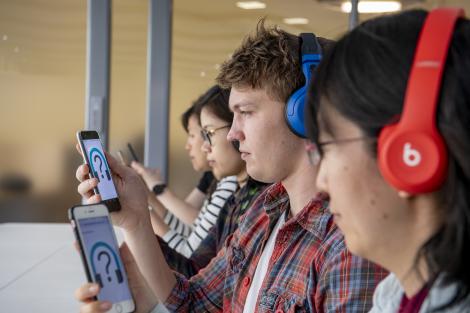The LifeGuide platform, developed at the University of Southampton, is a unique set of open-source internet-based software tools that allow researchers to flexibly create, modify and evaluate internet-based behavioural change interventions. The interventions have been deployed in ground-breaking, large scale, randomised controlled trials as well as being rolled out through social enterprise projects and scaling-up research funding.
Research challenge and context
Interventions designed to influence people’s behaviour are a fundamental part of daily life. These can be personal advice, support and skills training from professionals such as doctors, or information disseminated through the media.
However, advice on coping with health problems can be costly and is not always readily available to everyone. The Internet is a low-cost way of extending convenient healthcare for millions of people around the world to access 24 hours a day.
Numerous internet-based behavioural interventions had been developed but, as each intervention had to be programmed from scratch, the initial developments costs were high and the intervention could not be easily modified once it had been programmed.
A multidisciplinary team at Southampton, including academics from Psychology and Electronics and Computer Science, wanted to develop cost-effective web-based interventions that researchers and practitioners in the public, private and third sectors could retain control over, modify and reuse without having to buy expensive web programming support.

Our solution
People can get 24-hour access to online advice and support for a range of health interventions thanks to the world-leading LifeGuide software developed by researchers at Southampton.
The Southampton team developed the unique LifeGuide platform – the world’s first open source software that allows researchers who don’t have access to programming resources, the ability to create and modify online support for managing and preventing illness. There is no other existing software or research programme that allows non-programmers to develop these interventions.
The interactive technology means that each individual’s situation, concerns and preferences can be used to provide a tailored support programme that includes delivering automated text or email reminders, personalised feedback, help with planning and the chance to communicate with health professionals.
The LifeGuide platform builds on previous Southampton research in the designing and implementing of software platforms to empower scientists with ability to create effective digital interventions. Previous Southampton projects such as myExperiment have developed platforms that enable scientists to share workflows and computer simulated experiments to promote transparency and reusability of scientific methods. These principles of reducing time-to-experiment, sharing expertise and avoiding reinvention have been embedded in the LifeGuide programme of work.
What was the impact
LifeGuide is having an international impact with academics globally using it to develop new, cost-effective digital interventions that can be modified and reused without the need to buy in expensive web programming support. The LifeGuide platform has facilitated a large international community of behavioural scientists and clinicians who are designing and trialling digital behaviour change interventions at scale, and the successful dissemination of these interventions has established new care pathways benefiting many thousands of patients and healthcare service providers.
The free LifeGuide software has been downloaded more than 1,000 times since 2009 and the LifeGuide Community website has nearly 3,000 members who are using the software to develop interventions across the UK and internationally.
LifeGuide is already being used in a range of initiatives including:
- Disseminating an effective intervention to 435,000 members of the Royal College of Nursing to reduce the occurrence of hand dermatitis
- Promoting hygienic behaviour to reduce the transmission of infection
- Substantially reducing the prescribing of antibiotics in six European countries
- Helping patients and health professionals to better manage numerous common and serious health problems such as asthma, dizziness, back pain, hypertension, weight loss, stroke rehabilitation and cancer
- Supporting cochlear implant recipients remotely at home
Research collaborations with the LifeGuide team have also attracted well over £50m funding from the Medical Research Council, Engineering and Physical Sciences Research Council, Economic and Social Research Council, National Institute for Health Research, European Commission and medical charities.
Related projects
Find out more
Talk to our research team and find out more about this work.